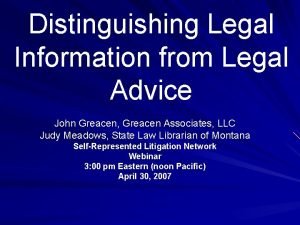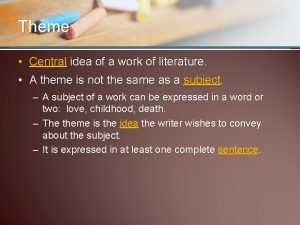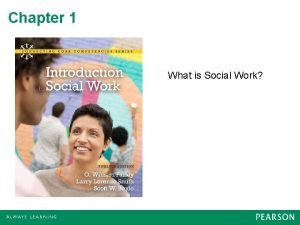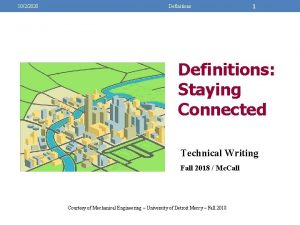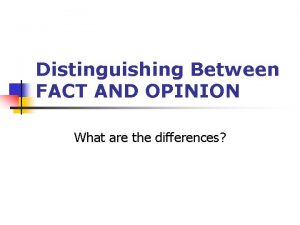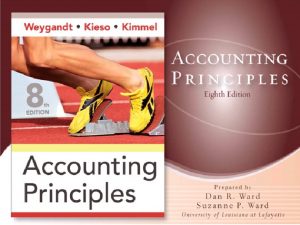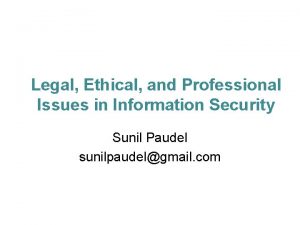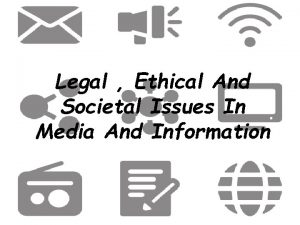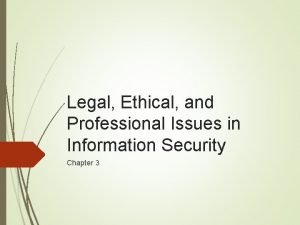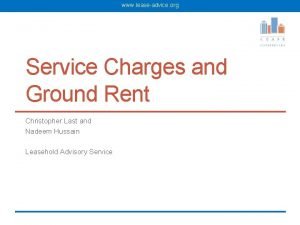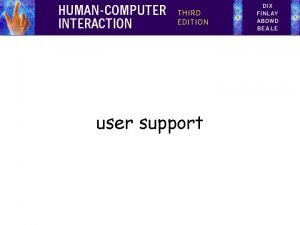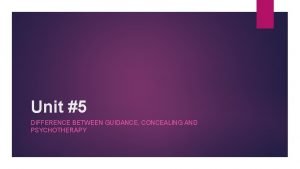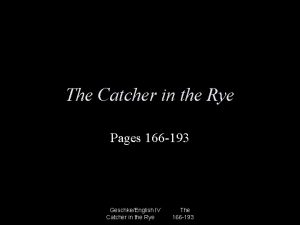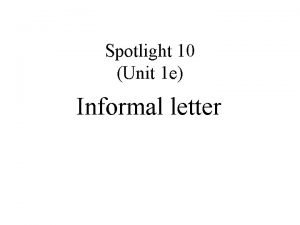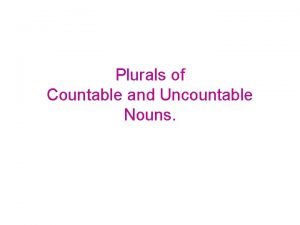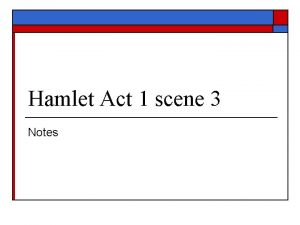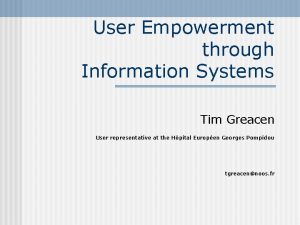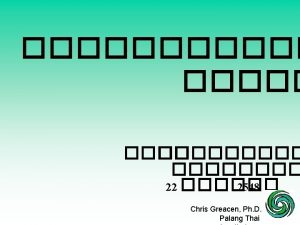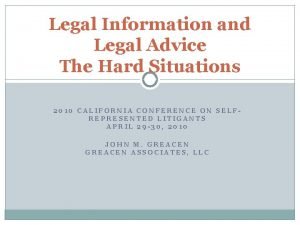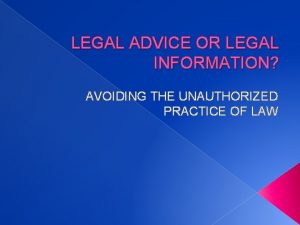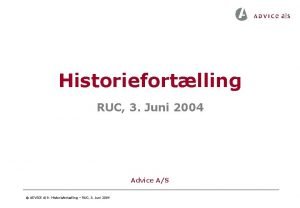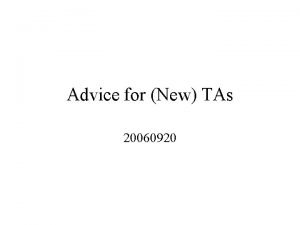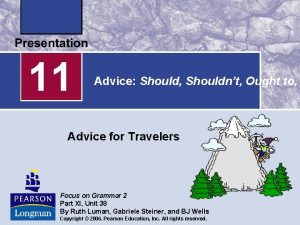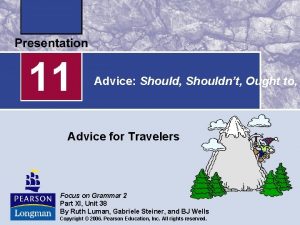Distinguishing Legal Information from Legal Advice John Greacen













































- Slides: 45

Distinguishing Legal Information from Legal Advice John Greacen, Greacen Associates, LLC Judy Meadows, State Law Librarian of Montana Self-Represented Litigation Network Webinar 3: 00 pm Eastern (noon Pacific) April 30, 2007

YOUR ROLE IN THE JUDICIARY

You are generally the first stop on the ladder to justice; the first person someone talks to; the first chance someone has to form an opinion about the courts.

KEY CONCEPTS ACCESS CUSTOMER SERVICE PROVISION OF ACCURATE INFORMATION PRINCIPLES OF EQUALITY, IMPARTIALITY & OPENESS

ACCESS Our doors are guaranteed to be open to all. Not familiar territory If customers do not understand how to use the system, and we don’t tell them, we are denying them access. By providing access, we advance the administration of justice.

CUSTOMER SERVICE This is why we are in this business. We are competent, cooperative, and we do all we can to assist in a timely manner.

PROVISION OF ACCURATE INFORMATION The Court is obligated to provide accurate information. Accessibility is affected by this accuracy. Small mistakes affect people’s lives.

EQUALITY All litigants must be treated fairly & equally. You may work to strengthen equality in the Courts by explaining your extraordinary knowledge about court procedures, requirements, & practices.

IMPARTIALITY Impartiality to the individual litigants and to the outcome of a particular case. You must provide the same information to either party.

OPENNESS Court proceedings are, in general, conducted in the open. An individual is permitted to participate in his/her proceedings. Openness also means that the participant and the public must be able to understand the process.

It is not up to you to decide who needs information. You provide appropriate assistance to anyone who requests it.

Your assistance to SRLs and your application of these principles furthers our goals of increasing the public’s trust and confidence in the Judiciary.

CLERKS CANNOT GIVE LEGAL ADVICE

MEANINGLESS

Problems with a vague standard Clerks tend to give less information Practice varies from court to court and clerk to clerk and day to day Clerks don’t treat everyone the same – Against laypersons and in favor of lawyers – Against difficult people and in favor of nice ones – Depending on the workload – Against minorities

Standards that don’t work Involving activities commonly performed by lawyers Requiring knowledge “greater than that possessed by the average citizen” Substance versus procedure Potential effect on the outcome of the case Importance to the requester Information applicable to a specific fact situation Situations where giving a different answer would constitute legal malpractice

Principles upon Which to Build a Sound Policy The courts must provide information to court users about how the process works The limitations on what court staff can provide derive from ethical principles governing the courts Court staff need clear guidelines

Ethical Obligations of Court Staff To remain impartial – with respect to parties in a case – with respect to lawyers To maintain confidential information To avoid ex parte communications To perform competently

State and Federal Guidelines Arizona California Florida Idaho Iowa Michigan Missouri New Mexico New Jersey New York North Dakota Utah Wisconsin Federal Judicial Center training materials

Definitions Legal information Facts about the law and the legal process Legal advice Advice about the course of action a client should take to further his or her own best interests

General Guidelines Legal information Staff should answer questions that call for factual information – questions that start with “who, ” “what, ” “when, ” “where, ” or “how. ” Legal advice Staff should not answer questions that call for an opinion about what a litigant should do – questions that contain the words “should” or “whether. ”

General Guidelines Legal information Staff should tell a litigant how to bring an issue to the attention of the court. Legal advice Staff should not suggest whether it is wise to bring that issue before the court, how best to present the issue, or how the judge is likely to decide the case.

General Guidelines Legal information Staff should inform a litigant of his or her options and the steps to carry out an option Legal advice Staff should not suggest which option the litigant should pursue

General Guidelines If you don’t know, don’t guess. Even if you would be allowed to provide the information if you knew it, you must say “I don’t know” if you are not sure. Refer these questions to a supervisor.

North Dakota’s guidelines Staff can explain common, routinely employed court rules and procedures Staff cannot suggest which of several available procedures a litigant should follow Staff should not attempt to apply a rule to the facts of a litigant’s case

North Dakota’s guidelines Staff can tell litigants how to file a complaint or other pleading Staff cannot advise litigants whether to file a complaint or other pleading, whom to name as a defendant in a complaint, what sort or amount of damages to seek, what arguments to include in a complaint or pleading, or what arguments to make in response to a filing by the other side

North Dakota’s guidelines Staff can provide litigants with pamphlets or information on how to present evidence in court Staff cannot tell litigants specific questions to ask witnesses in court Staff cannot recommend techniques for presenting evidence in court Staff cannot recommend objections to raise to motions or evidence submitted by the other side

North Dakota’s guidelines Staff may tell litigants how to request a continuance Staff may not recommend to litigants whether to request a continuance

North Dakota’s guidelines Staff can tell litigants what to do when they have settled a lawsuit Staff cannot recommend when or whether a litigant should settle a dispute

North Dakota’s guidelines Staff can explain the process for appealing a judge’s decision Staff cannot recommend whether a litigant should appeal a judge’s decision

North Dakota’s guidelines Staff can provide information about past rulings in a case Staff cannot predict what the court will do

North Dakota’s guidelines Staff can provide cites to (or show litigants how to find) statutes, court rules, and ordinances Staff cannot provide an analysis or interpretation of statutes or ordinances based on the specific facts of a litigant’s case Staff cannot perform legal research for a litigant

North Dakota’s guidelines Staff can explain what records are kept by the court and provide those records that can be made available to the public (including confidential files pertaining to the requestor) Staff cannot provide access to court records that are sealed

North Dakota’s guidelines Staff should recommend the use of a lawyer and provide information concerning lawyer referral services and legal aid Staff cannot recommend a specific lawyer

North Dakota’s guidelines Staff can provide forms and instructions, and record on the forms information provided by the litigants if the litigants are not capable of filling out the form themselves Staff cannot provide or suggest the information that should be entered on the forms

North Dakota’s guidelines Staff can provide general information about the courts, procedures and legal terminology Staff cannot provide advice about the course of action a litigant should take to further his or her own personal interests

North Dakota’s guidelines Staff shall not disclose the outcome of a case before the information is released to the public Except in emergencies, staff should tell litigants to put in writing information that they want to convey to the judge and provide a copy to the other side In emergencies, staff may convey to the judge information provided orally by a party

Guidelines are not enough Clerks need procedures manuals to which they can refer for correct answers to procedural questions Clerks need standard handouts on FAQs, such as service of process Information websites can be helpful to staff as well as to litigants Clerks need training Clerks need customer service skills

Reviewing Questions Submitted by Participants in Advance

Questions from Litigants 1. Should I hire an attorney? Do I need to have an attorney? 2. Who is a good attorney? 3. My ex refuses to let me have my daughter on Saturday nights even though that is what the court order says. What can I do? 4. My husband I are separated. He is an illegal alien. I want to make sure he cannot get my daughter. What do I do?

Questions from Litigants 5. The father of my child is not on the birth certificate and has been away most of her life. He just showed up and wants to start supporting her and seeing her. I don’t want to let him see her and am afraid that he will take her away from me. What do I do? 6. Do you have a form to establish joint legal custody?

Questions from Litigants 7. I did time for an assault three years ago. I want to get it off my record. How do I do that? 8. My daughter is 17 and she wants to divorce her mother. How does she do that? 9. My mother is in an assisted living facility but still owns a home. Can she get a refund on her property taxes?

Questions from Litigants 10. My mother can’t afford her eye drops. She has Part D Medicare but it doesn’t cover the drops. How can I get help paying for these drugs? 11. What if your landlord did not do a walkthrough with you prior to moving in. Do I have to do a walk-through now that the lease is coming to an end? Can I use the deposit to pay the last month’s rent?

Questions from Participants If a litigant asks for a form that you know is the wrong form, can I tell them what the right form is? Can I provide information on affirmative defenses and if so how? What about statutes of limitations? What about jurisdiction and venue?

Thank You For Participating
 John greacen
John greacen Chris greacen
Chris greacen Musicians union legal advice
Musicians union legal advice Central idea in literature
Central idea in literature Distinguishing features of kingdom protista
Distinguishing features of kingdom protista Elements of poetry
Elements of poetry Similarities between sociology and social work
Similarities between sociology and social work Technical definition examples
Technical definition examples Is main idea the same as central idea
Is main idea the same as central idea Chordates notochord
Chordates notochord Facts and opinions examples
Facts and opinions examples 4.3 distinguishing between atoms
4.3 distinguishing between atoms Distinguishing attack
Distinguishing attack Difference between letters and sounds in english
Difference between letters and sounds in english Manufacturing accounting basics
Manufacturing accounting basics Distinguishing features of managerial accounting
Distinguishing features of managerial accounting Distinguishing factor
Distinguishing factor What are two distinguishing characteristics of prokaryotes
What are two distinguishing characteristics of prokaryotes Distinguishing characteristics of plantae
Distinguishing characteristics of plantae Distinguishing among atoms
Distinguishing among atoms Law and ethics in information security
Law and ethics in information security Legal ethical and societal issues
Legal ethical and societal issues Legal and ethical issues in information security
Legal and ethical issues in information security Leaseadvice
Leaseadvice Persuasive open letter
Persuasive open letter It monitor users behavior and offer contextual advice
It monitor users behavior and offer contextual advice Guidance and counselling difference
Guidance and counselling difference Rejecting help
Rejecting help Antolini catcher in the rye
Antolini catcher in the rye A letter giving your news
A letter giving your news Advising on hotel services and items
Advising on hotel services and items The plural form of advice
The plural form of advice Advice column sample
Advice column sample Asking for and giving advice
Asking for and giving advice Digital advice and guidance tools
Digital advice and guidance tools Informal letter giving advice
Informal letter giving advice Letter of advice informal
Letter of advice informal Disadvantan
Disadvantan Act 1 scene 3 of hamlet
Act 1 scene 3 of hamlet Direct vs indirect sentence
Direct vs indirect sentence Giving advice conversation
Giving advice conversation Advice to avoid computer addiction
Advice to avoid computer addiction Aurélien bignon
Aurélien bignon Obey your mouth
Obey your mouth Asking and giving advice
Asking and giving advice Advice for applying machine learning
Advice for applying machine learning
